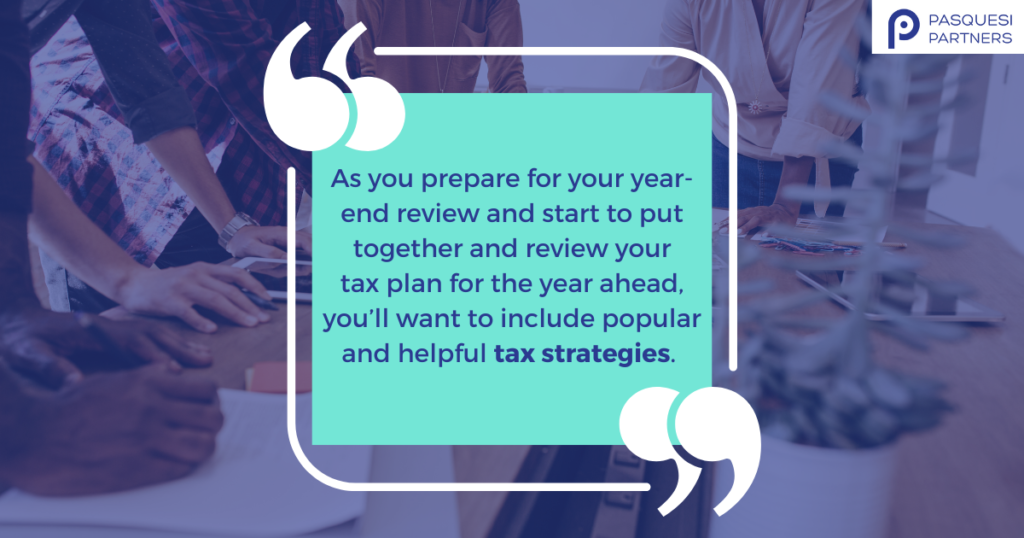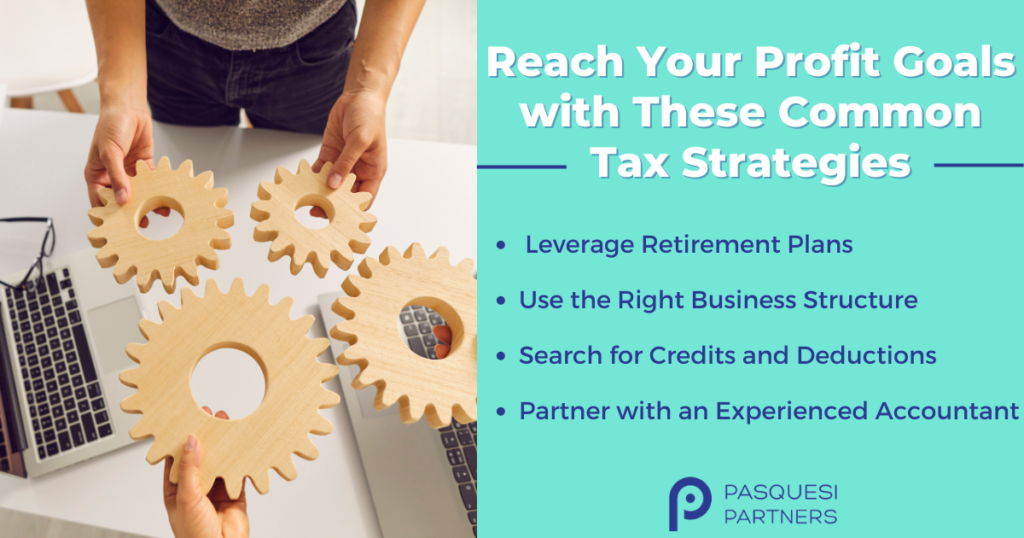When you think of a tax strategy, you probably think of putting a plan together to save money. When you think of saving money, you think of more profit.
Now, there’s a logical connection between these two ideas, because creating a tax strategy for your business will help you increase your profits.
As you prepare for your year-end review and start to put together and review your tax plan for the year ahead, you’ll want to include popular and helpful tax strategies.
Let’s look at some common tax strategies to see how they align with your profit goals.

Bridging the Gap Between Tax Strategies and Profit
It’s important to know that tax strategies and profit growth are both parts of a greater financial plan, and they are both ultimately designed to work together.
So how are these two entities intertwined? Well, there are two ways to look at it.
Improved Cash Flow
Tax strategies and profit are connected to cash flow. Implementing tax strategies helps you create more cash flow (through savings), and with that additional cash flow, you’ll have more money flowing through your business.
This extra money opens up more opportunities for investments, expansions, etc. In theory, the more you save from not having to pay taxes, the more profit you have.
Less Profit is More Savings
Tax strategies are designed to make it look like you’ve made less profit than you actually have because less profit means fewer taxes.
For example, your business could use tax deductions to make it seem like you made fewer profits than you actually did. Then, you would only have to pay taxes on the amount that you profited after the deductions.
If you didn’t use tax deductions, you would have to pay taxes on the full amount of your profits, which would definitely cost you more money.
Using deductions is just one example of an effective tax strategy. There are plenty of other tax strategies that help business owners find ways to make it appear like they have fewer profits, and these tactics lead to more savings for the business.

Reach Your Profit Goals with These Common Tax Strategies
Leverage Retirement Plans
When it comes to setting up a retirement plan, the benefits are endless. First, contributing to a retirement plan reduces your taxable income. Thus, you will have to pay less in taxes each year that you contribute to your retirement plan.
Additionally, the assets in your plan grow tax-free, which means that you won’t have to pay taxes on the money that you invest until you’re ready to withdraw that money. Retirement plans are extremely beneficial for the individual, but they also can be advantageous for the business overall.
It’s important to note that retirement plans can help your business keep its employees as well. Top talent wants and deserves maximum benefits, so they look for companies that offer retirement plans. If your business offers a retirement plan, you are more likely to retain your employees. Therefore, you will not have to pay for continuous training costs.
Use the Right Business Structure
Your business structure will affect the way you are taxed, so it’s very important to choose the right business structure. In most cases, you’ll choose from:
- LLC
- Sole proprietorship
- Partnership
- S-corporation
- C-corporation
We advise that you speak with your accountant for an expert opinion. They’ll be able to help you weigh out the pros and cons of each option.
This strategy may not seem like it would have a big impact on your taxes, but choosing the right option will save you a lot of money and help you get much closer to your profit goals.
Search for Credits and Deductions
Searching for credits and deductions is another way to prepare for an efficient tax season and lower your taxable income. There are a variety of credits and deductions that you can use to save money. You just have to be aware of them so that you can meet all of the requirements.
Do some research and figure out which credits and deductions apply to your business. Also, ask your accountant if he/she knows of any credits that you might qualify for. Then, take advantage of them. These programs can lower your taxable income and therefore lower your tax liability.
Partner with an Experienced Accountant
Maybe tax preparation seems daunting to you or maybe you just want an expert to help you maximize your savings. Either way, consider partnering with an experienced accountant.
Hiring an accountant might cost more upfront, but the return on your investment is unbeatable.
Pasquesi Partners has many accountants who can help you align your tax strategy with your profit goals and ultimately, save you money.
Contact us today to learn how we can help your business grow!